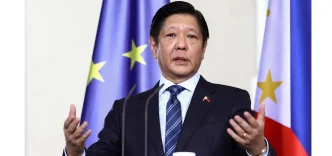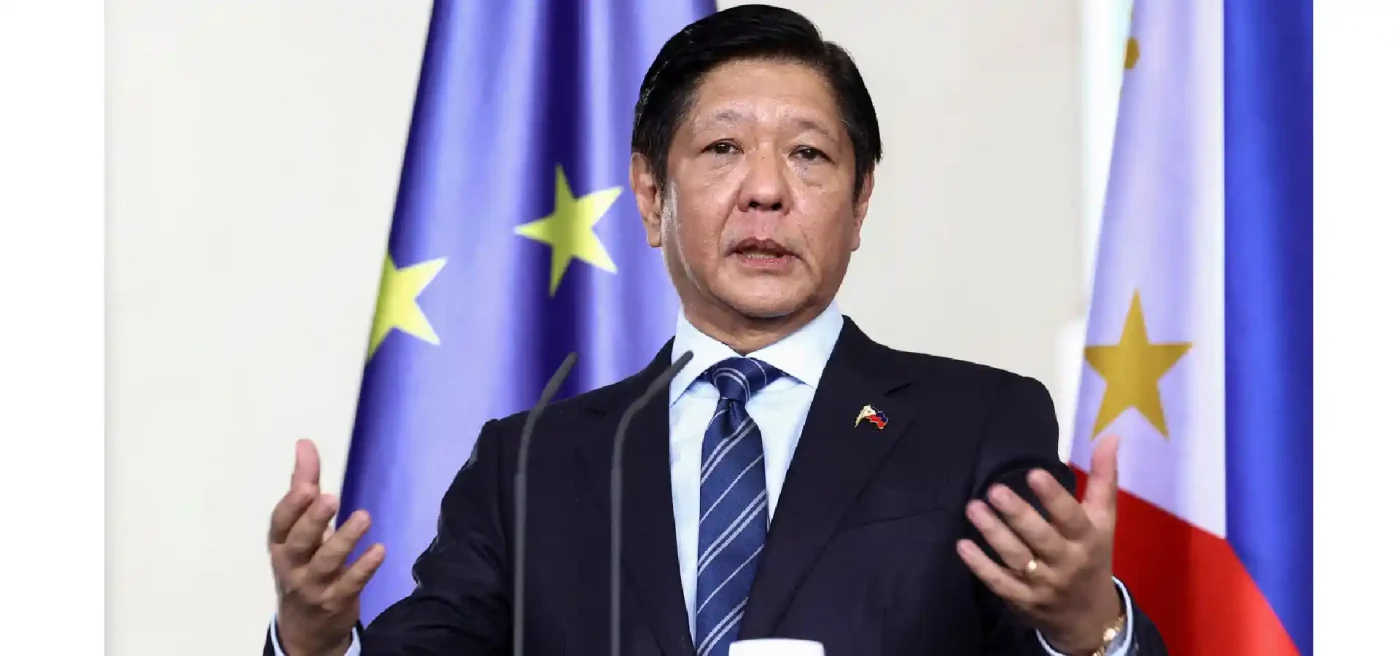In a dramatic escalation of political tensions in the Philippines, allies of former President Rodrigo Duterte have attempted to file an impeachment complaint against President Ferdinand Marcos Jr, accusing him of constitutional violations over the arrest and transfer of Duterte to face trial at the International Criminal Court (ICC). The move, initiated by former Duterte Youth party-list representatives Ronald Cardema and Duceille Marie Cardema, has reignited debates over national sovereignty, legal obligations, and the deepening rift within the country’s political elite.
Failed Filing Amid Procedural Hurdles
The Cardemas arrived at the House of Representatives’ Office of the Secretary General on May 8, 2025, intending to submit a verified impeachment complaint. Their timing, however, collided with procedural barriers. Arriving at 3:20 p.m., they were informed that only House Secretary General Reginald Velasco could receive such a document. With Velasco unavailable and the office engaged in a strategic planning session—scheduled from May 6 to 8, as indicated by a posted notice—the couple waited until the close of business hours before departing without filing the complaint.
Adding to the delay, the Batasang Pambansa, the legislative complex housing the House of Representatives, observes closure on Fridays. Even if the complaint had been submitted, Speaker Martin Romualdez noted that no action could be taken until Congress resumes session on June 2, with the 19th Congress set to adjourn shortly after on June 13. “We’re not in session right now, so not much can be done” said Romualdez during an impromptu interview in Tacloban City on the evening of May 8.
Allegations of Constitutional Breach
The 24-page complaint, reportedly endorsed by current Duterte Youth representative Drixie Mae Cardema, Ronald’s sister, centers on Marcos’s alleged role in facilitating Duterte’s arrest by Interpol on March 11, 2025, and his subsequent transfer to the ICC. The Duterte camp argues that the Philippines, having withdrawn from the Rome Statute in 2019, no longer falls under ICC jurisdiction. They contend that Marcos’s decision to allow the transfer represents a “culpable violation of the Constitution” and a “betrayal of public trust” by ceding sovereignty to an international body.
Specifically, the complaint asserts that Marcos overstepped his authority by not subjecting the international warrant to domestic judicial review. “It is not within the President’s prerogative to unilaterally decide the validity of an international warrant; rather, it is the exclusive authority of Philippine courts to determine whether such an order has legal effect within the country’s jurisdiction” said the Cardemas in a statement issued after their failed filing attempt. They further argued that the Constitution mandates that jurisdiction over crimes committed in the Philippines rests with local courts, and any extradition or international cooperation must undergo domestic legal scrutiny.
Palace Defends Legality of Arrest
Malacañang, the presidential palace, has consistently defended the legality of Duterte’s arrest, emphasizing that the government’s actions were in line with its obligations to cooperate with the International Criminal Police Organization (Interpol), rather than the ICC directly. The administration has cited Section 17 of Republic Act No. 9851, known as the Philippine Act on Crimes Against International Humanitarian Law, Genocide, and Other Crimes Against Humanity, which permits authorities to surrender or extradite individuals to international courts or other states under applicable laws and treaties.
Marcos and his officials have maintained that their cooperation was limited to Interpol’s request, sidestepping direct engagement with the ICC. This distinction, however, has failed to quell criticism from Duterte’s allies, who view the arrest as a politically motivated act orchestrated by Marcos amid a broader fallout with Vice President Sara Duterte, Rodrigo’s daughter. Sara herself faces an impeachment trial set to commence when Congress reconvenes in July, further intensifying the political stakes.
Legal Experts Divided on Arrest’s Validity
The legal underpinnings of Duterte’s arrest and transfer remain contentious among scholars and former officials. Some, including former Executive Secretary Salvador Medialdea, argue that Duterte should have been brought before a Philippine court prior to any transfer, ensuring domestic legal processes were followed. Others, such as retired Associate Justice Antonio Carpio, assert that the arrest aligns with RA 9851, which criminalizes genocide and crimes against humanity and provides a framework for international cooperation.
Adding to the complexity, a 2021 Supreme Court ruling clarified that the Philippines retains continuing obligations to cooperate with the ICC, even post-withdrawal from the Rome Statute. This precedent undermines the Cardemas’ central argument that the ICC lacks jurisdiction over the country. International legal experts, while generally agreeing that the ICC retains jurisdiction over Duterte for alleged crimes committed during his presidency, remain split on whether the specific process of his arrest was legally sound under Philippine law.
Political Context and Implications
This impeachment attempt marks the first formal challenge of its kind against Marcos since his fallout with Sara Duterte, highlighting a deepening schism within the ruling coalition that once united the Marcos and Duterte dynasties under the “UniTeam” banner during the 2022 elections. The fracture has been fueled by policy disagreements, personal rivalries, and now, legal battles over Duterte’s accountability for alleged human rights violations during his controversial “war on drugs.”
Ronald Cardema, a staunch Duterte loyalist, previously served as a national youth commissioner under Duterte’s administration and represented the Duterte Youth party-list in Congress, alongside his wife Duceille Marie during the 18th Congress. Their involvement in this impeachment push underscores the enduring influence of Duterte’s political machinery, even as the former president faces international scrutiny for policies that critics claim resulted in thousands of extrajudicial killings.
For Marcos, the impeachment complaint, though procedurally stalled, poses a symbolic threat. It amplifies public and political discourse around his administration’s handling of sovereignty and international relations. Critics of Marcos argue that his government’s cooperation with Interpol risks setting a precedent for foreign intervention in domestic affairs, a sensitive issue in a nation with a history of colonial subjugation and foreign influence. Supporters, however, see the move as a necessary step to uphold the rule of law and restore the Philippines’ standing in the global community after years of Duterte’s defiant rhetoric against international bodies.
Procedural and Practical Challenges Ahead
Even if the Cardemas succeed in filing their complaint upon Congress’s return, the impeachment process faces significant hurdles. Under the Philippine Constitution, an impeachment complaint must be initiated by at least one-third of the House of Representatives to proceed to a trial in the Senate. Given Marcos’s substantial support within the current Congress, largely dominated by allies under Speaker Romualdez’s leadership, the likelihood of the complaint gaining traction appears slim.
Moreover, the Cardemas’ frustration with procedural norms—evident in their statement that it is a “ministerial duty” for any government office to receive documents, regardless of whether the head of office is present—may resonate with segments of the public disillusioned with bureaucratic inefficiencies. Yet, it also risks portraying their effort as hasty or ill-prepared, potentially undermining its credibility among lawmakers and legal observers.
Broader Questions on Sovereignty and Accountability
Beyond the immediate political theater, the impeachment attempt raises profound questions about the balance between national sovereignty and international accountability. The Philippines’ withdrawal from the ICC under Duterte was framed as a defense of sovereignty, a stance that resonated with many Filipinos skeptical of foreign oversight. Marcos’s apparent reversal, even if through Interpol rather than direct ICC cooperation, has reopened old wounds and debates about whether the country can—or should—address its human rights record independently.
For Duterte’s supporters, the arrest and potential trial represent a personal and political vendetta, orchestrated by domestic rivals and international critics. For human rights advocates, however, it is a long-overdue reckoning for a leader whose policies they argue flouted both domestic and international law. The outcome of this impeachment push, however symbolic, could shape public perception of Marcos’s commitment to constitutional principles versus his willingness to navigate global expectations.
As the Philippine Congress prepares to reconvene, the specter of dual impeachment proceedings—against both Marcos and Sara Duterte—looms large. Whether this latest move by Duterte’s allies will galvanize opposition or fizzle amid procedural and political realities remains uncertain, but it has undeniably thrust the nation’s most powerful political families back into the spotlight, with consequences that could reverberate far beyond Manila’s legislative halls.
















